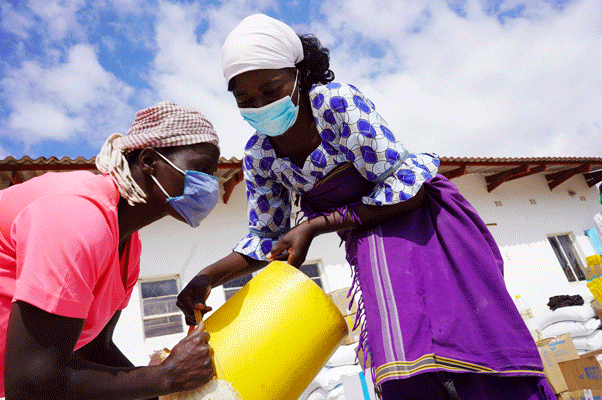
BY SILAS NKALA
THE food security situation in most parts of Matabeleland has reportedly worsened amid reports that some families are now only surviving on a single meal a day.
According to the latest survey by Habakkuk Trust, some rural communities in Matabeleland have gone for over two months without receiving food aid from the department of social welfare and non-governmental organisations.
“Incessant rains and recurring droughts resulting from climate change have affected yields in most areas. Covid-19-induced lockdown regulations have further compounded the food crisis as borders are closed,” read results of the survey.
“Most people in the region were dependent on diaspora remittances and would access cheaper basic commodities in Botswana and South Africa with the help of cross-border transporters. However, the lockdown has seen an increase in vulnerable populations.”
The hardest-hit families were reportedly struggling to have a day’s meal with some even spending up to three days without proper staple food such as maize meal.
“The elderly and vulnerable have been the worst affected by the absence of food aid,” reads the report.
In Bubi ward 19 of Matabeleland North, some communities have gone for two months without aid.
- Chamisa under fire over US$120K donation
- Mavhunga puts DeMbare into Chibuku quarterfinals
- Pension funds bet on Cabora Bassa oilfields
- Councils defy govt fire tender directive
Keep Reading
“We have been told that there is no maize at the Grain Marketing Board and this is affecting distribution,” said a community member.
The report states that in Matobo ward 19 and Umzingwane ward 5, Matabeleland South, food aid was last distributed in June while Bulilima ward 10 last received in May and other areas have been receiving aid from humanitarian organisations only.
“The absence of adequate social safety nets has worsened the plight of the vulnerable households during the Covid-19 lockdown,” reads the report.
A traditional leader in Insiza, Chief Ndube born Nonhlanhla Sibanda, said the social welfare department had since stopped giving food to the vulnerable elders.
“We thank the Organisation of Rural Association of Progress [Orap] that is giving some community members food. The social welfare department is currently not giving people food and starvation is in those who depended from it,” Chief Ndube said.
A Gwanda traditional leader, Chief Mathema, said starvation was serious in his area.
“Serious hunger has hit both people and their domestic animals. The social welfare is there, but it only gives food to a limited number of people. The food is so little and not enough for all the people. It’s so serious,” Chief Mathema said.
“Cattle need stock feed.
“We need a permanent solution to this. For now people are buying feeds, but it’s expensive. The prices are in United States dollars which people are not getting.”
Humanitarian agencies estimate that millions face hunger, with the World Food Programme (WFP) on July 31 putting the figure of food-insecure Zimbabweans at 8,6 million.
According to the WFP, the desperate situation faced by many is exacerbated by the combined effects of drought, economic recession and the Covid-19 pandemic.










